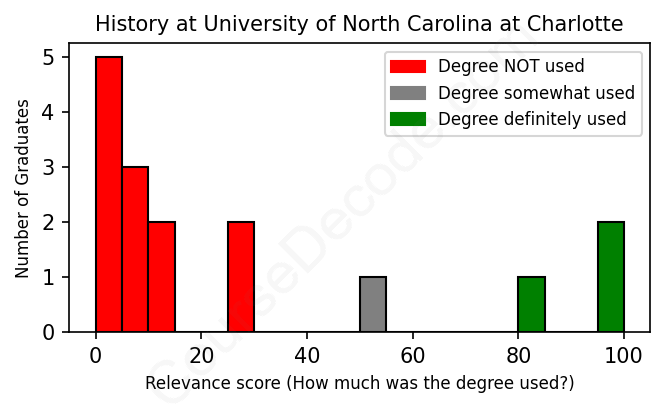
First, some facts. Of the History graduates from University of North Carolina at Charlotte we've analyzed , here's how many have used (or NOT used) their degree in their career:

These are estimates based on AI analysis of 16 LinkedIn profiles (see below).
The verdict? Horrible! Overall, with an average relevance score of 26%, History graduates from University of North Carolina at Charlotte have an exceptionally lower likelihood (-41%) of finding work in this field compared to the average graduate across all fields:
And for comparison, here's the chart for all profiles we've looked at across all degrees.
Also, after graduating, only 31% of these graduates have pursued further education other than another Bachelor's degree (such as a Masters degree or other), compared to the average across all profiles of 35%. This suggests a Bachelors degree is enough for most History graduates, and it's normal to look for work straight after graduation.
See the details:
|
Relevance score: 26% We think this person has NOT gone into a career related to their degree. We think this person has NOT gone into a career related to their degree.
DEGREE INFOGraduated in 2017 from University of North Carolina at Charlotte with a Bachelor's degree in History. No other secondary education since. JOB HISTORY SINCE GRADUATIONManager on Duty Mattress Firm Nov 2017 - Sep 2018 Business Development Associate  Gallagher Dec 2018 - Feb 2021 Customer Support Team  ATI Industrial Automation Mar 2021 - Oct 2021 Account Manager Inside Sales - Canada  ATI Industrial Automation Oct 2021 - Present ABOUTNo information provided. |
The top 10 most common jobs done by the graduates we've analyzed (ranked most common to least) are:
Here is a visual representation of the most common words in job titles for History graduates (this is across all History graduates we've analyzed, not just those who went to University of North Carolina at Charlotte):

Looking at the career trajectories of graduates from the University of North Carolina at Charlotte with a degree in History, it seems like there's a mix of outcomes. Many of these folks appear to start off in jobs that aren't directly related to history—think cashier positions, customer service roles, or even teaching assistants. For instance, the early career moves include roles like being a cashier at Lowe's or a food server. It’s not unusual for graduates to take on these sorts of jobs as they figure out what they really want to do, especially right after graduation.
As you look at what these graduates are doing five or ten years down the line, the picture starts to become a bit more specialized. Some have made strides into positions that utilize their educational background, like teaching at colleges as adjunct instructors or securing roles as a professor. Others have taken on more managerial or content-focused jobs, which could connect back to the skills they learned in their history programs, such as research, writing, and critical thinking. However, there’s still a noticeable number of alumni who have landed in roles not directly tied to history, suggesting that while a degree in History can be valuable, it might not always lead directly to history-related careers. Overall, it's a bit of a mixed bag, with some thriving in their chosen fields while others are exploring a variety of different paths that might be more about opportunity than direct relevance to their degree.
Getting a Bachelor’s degree in History at UNC Charlotte, or anywhere, really depends on your interests and how you like to learn. History can be challenging because it often involves a lot of reading, writing, and analysis of different time periods, cultures, and events. If you’re someone who loves digging deep into stories and figuring out how the past shapes our present, you might find it pretty engaging and not too hard. But, if you’re not super into writing papers or memorizing dates, it could feel a bit tougher. Overall, it’s about on par with most liberal arts degrees—meaning it has its challenges, but it can be a rewarding and fascinating journey if you enjoy learning about the world through its history.
Most commonly, in the LinkedIn profiles we've looked at, it takes people 3 years to finish a Bachelor degree in History.
Looking at these graduates from UNC Charlotte, it seems like their financial success really varies depending on their career paths. Some, like the one who became a Lead Credit Risk Officer at Wells Fargo or the Byron K. Trippet Assistant Professor of History, likely have decent salaries, especially compared to the others who took on more entry-level or part-time jobs along the way, like cashiers and servers. A few have managed to freelance or teach, which can be hit or miss in terms of steady income. Overall, while some are clearly doing well, others might still be working their way up or piecing together multiple jobs to make ends meet. So, it's a mixed bag when it comes to whether they’re making decent money!
Here is a visual representation of the most common words seen in the "about" section of LinkedIn profiles who have a Bachelor degree in History (this is across all History graduates we've analyzed, not just those who went to University of North Carolina at Charlotte). This may or may not be useful:

Here are all colleges offering a Bachelor degree in History (ordered by the average relevance score of their History graduates, best to worst) where we have analyzed at least 10 of their graduates: